Story by V. Michelle Bernard / Photos by Brian Tagalog
Historically, the Seventh-day Adventist Church has relied heavily on old-style revival efforts, prophecy seminars in public spaces and other traditional forms of evangelism. In the last 20 years, popular speakers have transmitted their sermons to local churches via satellite—all to share the unique Seventh-day Adventist message.
At the recent Transformational Evangelism conference, pastors from across th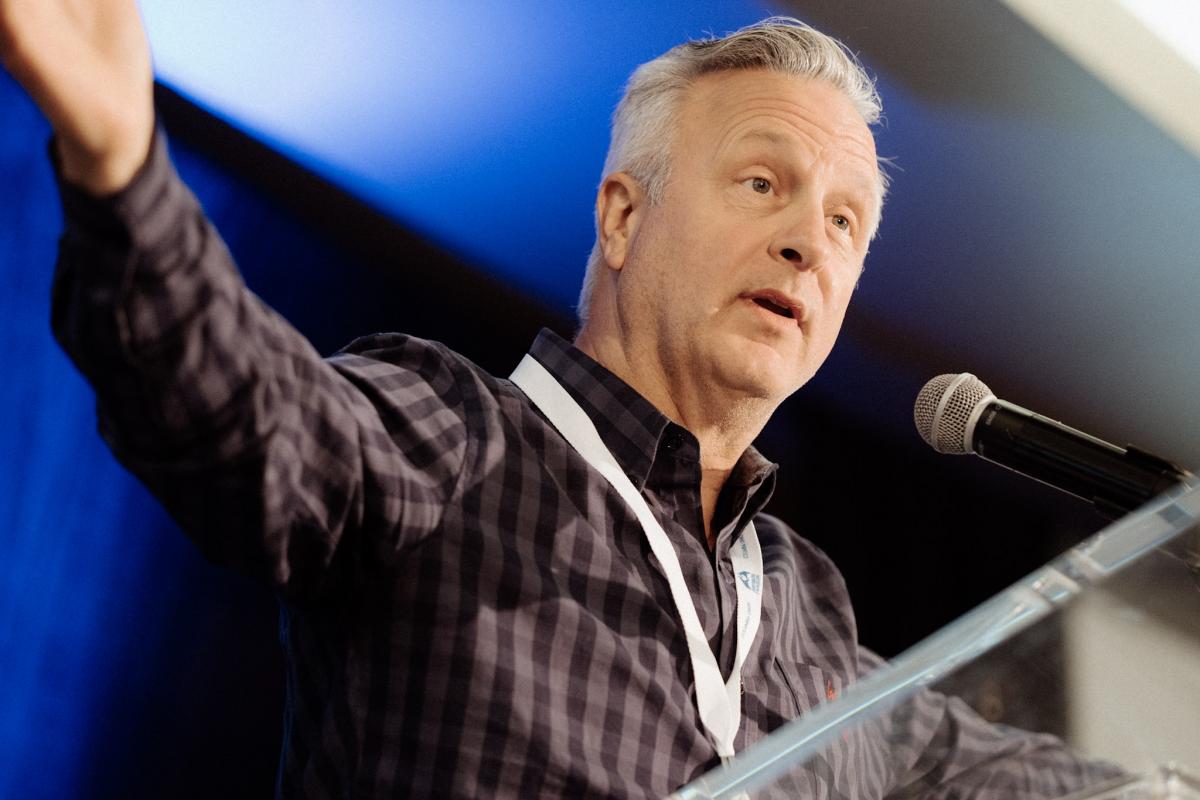 e Columbia Union Conference gathered to grapple with several questions: What are the best methods to share the message? Whose job is it to evangelize? What is the missing element in many evangelism efforts? And is it really evangelism if you don’t make an appeal?
e Columbia Union Conference gathered to grapple with several questions: What are the best methods to share the message? Whose job is it to evangelize? What is the missing element in many evangelism efforts? And is it really evangelism if you don’t make an appeal?
During the three-day event held in Columbia, Md., 160 attendees listened to speakers who presented myriad ideas for effective evangelism and discussed how to implement them in today’s increasingly secular society.
“We’ve done [evangelism] the same way for so many years, and we’ve seen diminishing results, and our churches [and pastors] are discouraged,” says event organizer Frank Bondurant (pictured above), vice president for Ministries Development at the union. “We tend to have a very narrow view of what evangelism looks like and how it works, ... so we wanted to expose them to a whole spectrum of different ways that our churches in the Columbia Union are reaching out to their communities and introducing people to Jesus.”
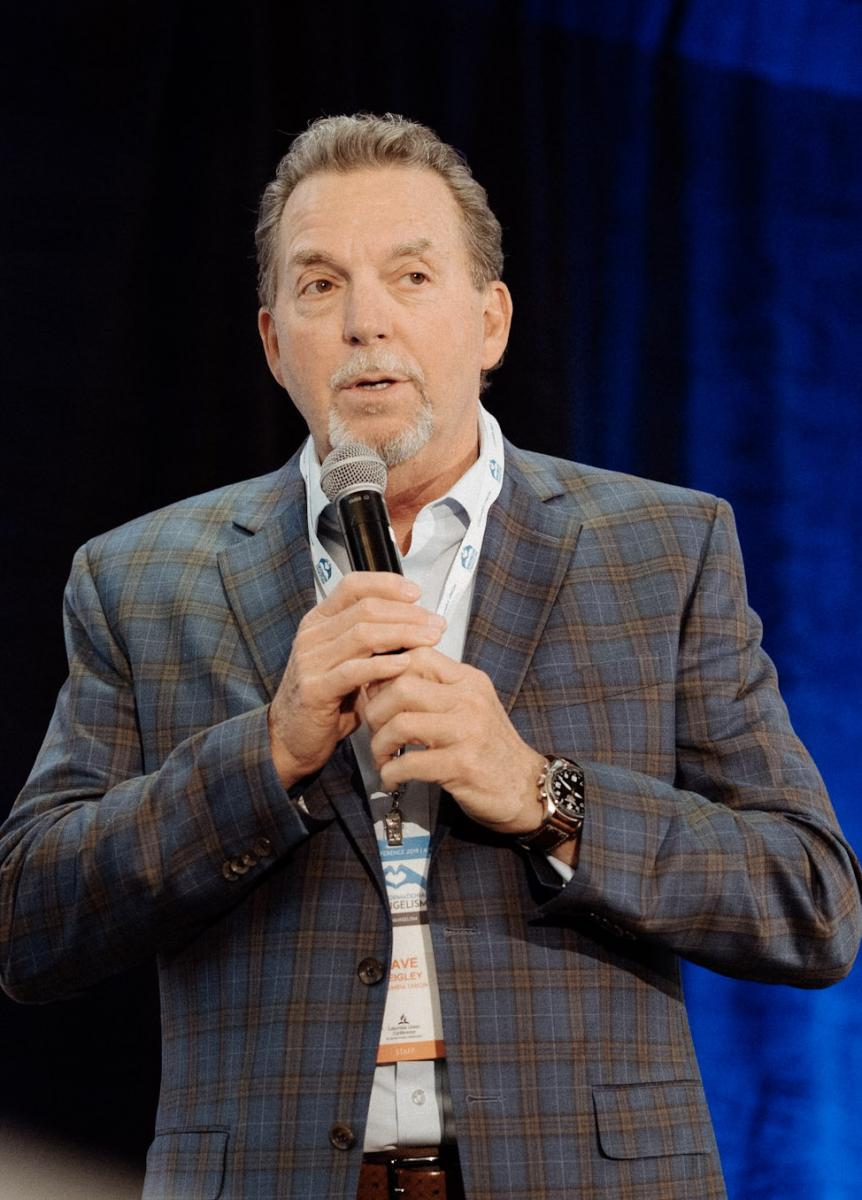 Union President Dave Weigley (pictured left) adds, “Transformational Evangelism is about more than what most people think of as traditional evangelism. It’s where the church attempts to transform itself into being continually ‘on’ for soul-winning—always recognizing lost people who walk through the door, being user-friendly, transparent, etc. ... It’s really getting at the idea of something that’s relevant and meaningful [in today’s world].”
Union President Dave Weigley (pictured left) adds, “Transformational Evangelism is about more than what most people think of as traditional evangelism. It’s where the church attempts to transform itself into being continually ‘on’ for soul-winning—always recognizing lost people who walk through the door, being user-friendly, transparent, etc. ... It’s really getting at the idea of something that’s relevant and meaningful [in today’s world].”
Members on Mission
“In many parts of the world, the church isn’t growing,” said Bill McClendon, vice president for Administration at the North Pacific Union Conference, during his “Transforming Disciples Into Disciple-makers” presentation.
“In North America it has plateaued for a number of years. ... We’re encouraged when we hear mes- sages of what is happening overseas. It’s almost as if we’ve given up on the idea that it could happen here. ... Unless something changes, we will be the first generation to hand off a church that is weaker than when we found it.”
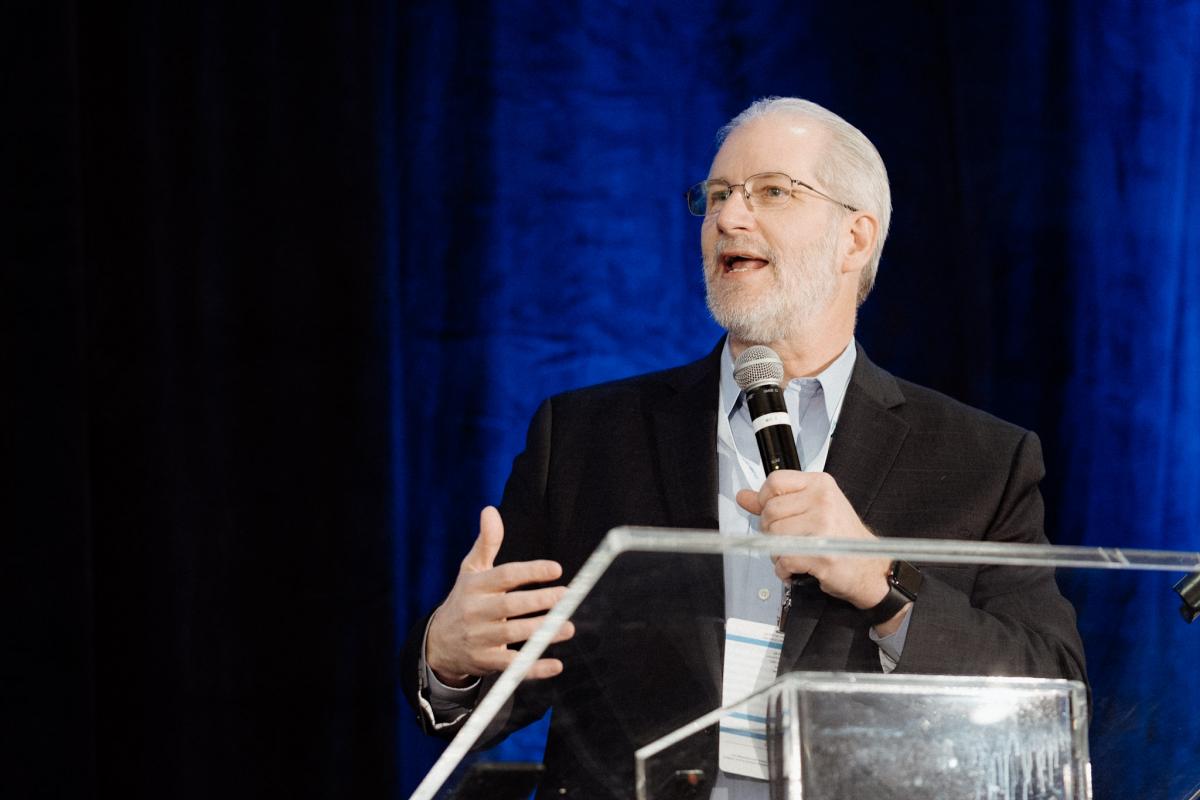 McClendon (pictured right) thinks the church can do better. “God is a god that inspires life and can bring life out of the most barren places,” he told the pastors. “You aren’t the one to do all the work of the ministry. You’re called to lead an organization of believers and charge them to do ministry for the Lord.”
McClendon (pictured right) thinks the church can do better. “God is a god that inspires life and can bring life out of the most barren places,” he told the pastors. “You aren’t the one to do all the work of the ministry. You’re called to lead an organization of believers and charge them to do ministry for the Lord.”
Potomac Conference pastors Jennifer Deans (see presentation) of the Living Faith and Cornerstone congregations in Northern Virginia, and Tim Madding of Beltsville’s Ammendale and Tech Road churches in Maryland, also encouraged the pastors to empower members to participate in the disci- pling and evangelism process.
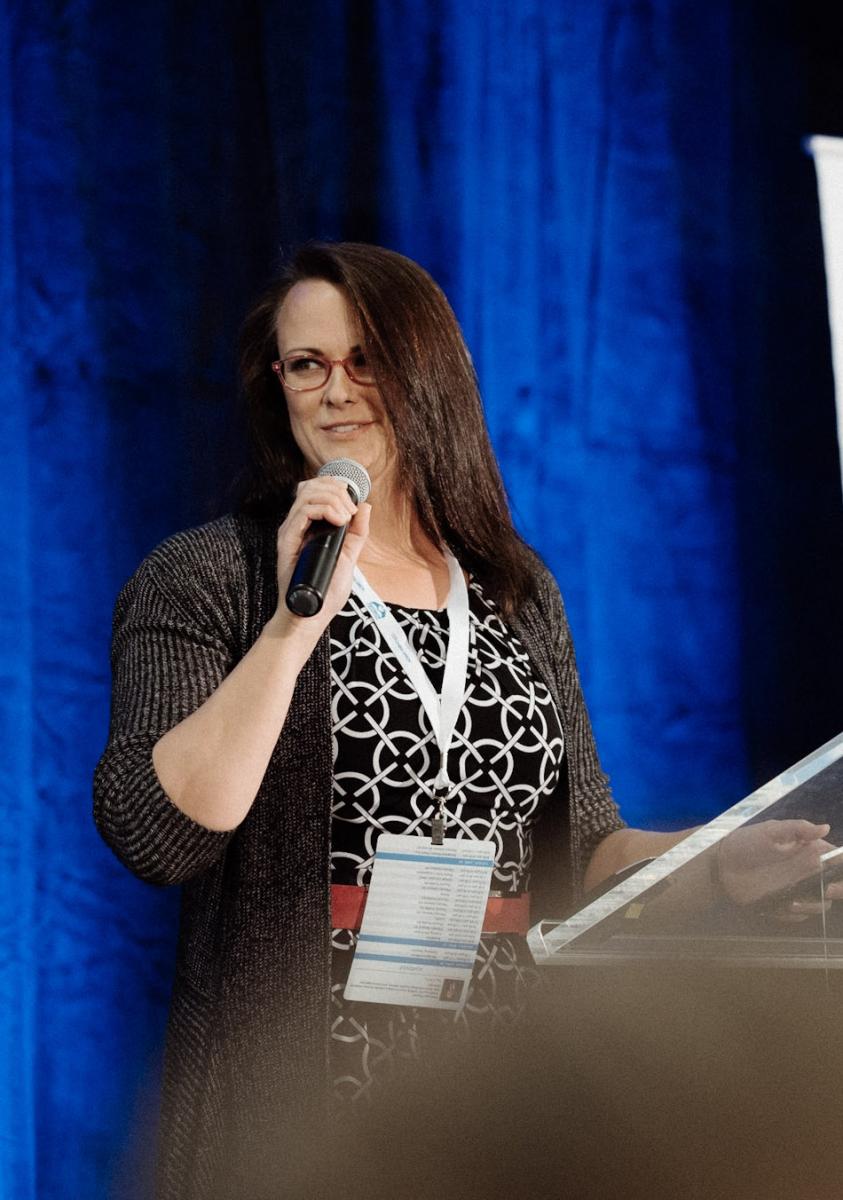 Deans (pictured left) said, “God has told us to invest in the people who He’s put in our lives. It’s His job to convict, and 100 percent of our mission as pastors is to send our people as missionaries.”
Deans (pictured left) said, “God has told us to invest in the people who He’s put in our lives. It’s His job to convict, and 100 percent of our mission as pastors is to send our people as missionaries.”
She continued, “We [often] feel that unless our members [go] through a class, that they’re [not prepared] enough to share the story of God,” reminding the crowd that Jesus sent the disciples out in pairs with only the Holy Spirit.
Deans and her church leaders are working to create a culture where members are always 100 percent “on mission.” She shared an example of a member who would wait until his neighbors left the halls in his apartment building before leaving in the morning.
“He started realizing he needed to be a missionary,” and now waits until he hears people in the hall before leaving so he can talk and grow relationships.
The same man, who teaches violin, starting sharing his faith with an atheist student during her music lessons, and said, “I think you’re an atheist with questions.” She later opened up and spent almost two full lessons talking about her faith questions. The student eventually chose to be baptized.
While not all connections made by members result in baptisms, Dean’s members now have 400 people they are impacting on a regular basis through relationships, a number that wouldn’t be so high if the group didn’t see themselves as disciples.
Reflecting on this point, event attendee Regina Johnson, the administrative pastor at Allegheny West Conference’s Grace Community church in Euclid, Ohio, shared a story about one of her younger parishioners who recently shared a post on Instagram saying an interaction with her had been “life-changing.”
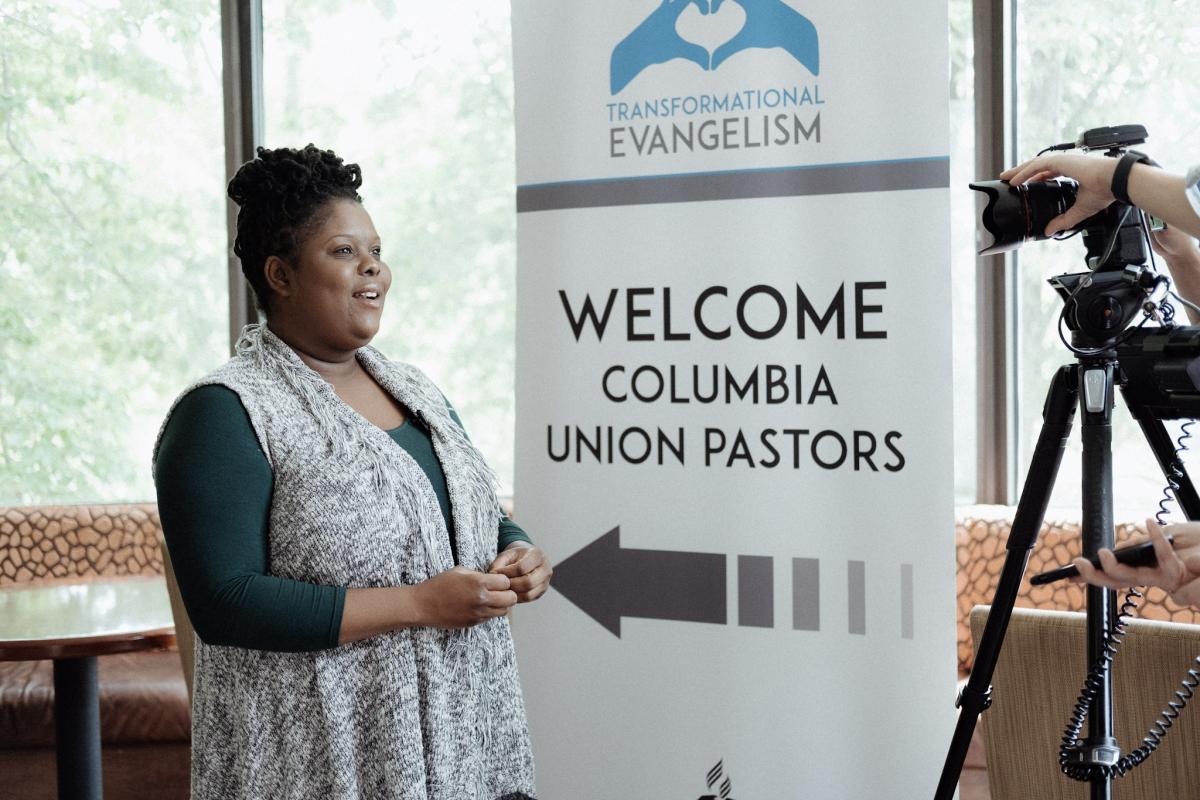 Johnson (pictured right) didn’t recall anything special in their interaction, but remembered that in the past she had opened up to the young lady about some similar struggles they both shared. That moment of encouragement strengthened their relationship.
Johnson (pictured right) didn’t recall anything special in their interaction, but remembered that in the past she had opened up to the young lady about some similar struggles they both shared. That moment of encouragement strengthened their relationship.
“There are times where I’m not looking to try and share my story. But when I meet somebody who is going through something that I’m going through, if I’m willing to be transparent, it’s going to come out,” said Johnson, who thinks the member will do the same for others now. “When she meets someone else, she’s going to be able to say, ‘Hey, I also dealt with that, and this is what I did, and this is how I overcame.’ How do you think that’s going to help and impact the church culture? What could that do if we had more authentic people in our churches? I think they can change the church completely ... and shift our narrative.”
 Johnson continued, “I think for so long [church members] act like we’re a bunch of perfect people coming to serve a perfect God. And I think when we are able to come in and realize we’re a bunch of non-perfect people, serving a perfect God, [it will be] encouraging to know that I’m sitting next to somebody who also is trying to get it right. ...I think as young adults, I don’t feel like we had a generation that was above us that opened up and shared.”
Johnson continued, “I think for so long [church members] act like we’re a bunch of perfect people coming to serve a perfect God. And I think when we are able to come in and realize we’re a bunch of non-perfect people, serving a perfect God, [it will be] encouraging to know that I’m sitting next to somebody who also is trying to get it right. ...I think as young adults, I don’t feel like we had a generation that was above us that opened up and shared.”
Johnson concluded, “What could that do if we had more authentic people in our churches? I think [it could] change the church completely.”
Method Swap
“One of the things that boggles my mind is [how we] sometimes do the same thing repeatedly, challenged opening session presenter Roger Hernandez (See presentation), director of Ministerial & Evangelism at the Southern Union Conference. “At some point we have to say, ‘Our message is unchangeable, our method needs to be contextualized.’”
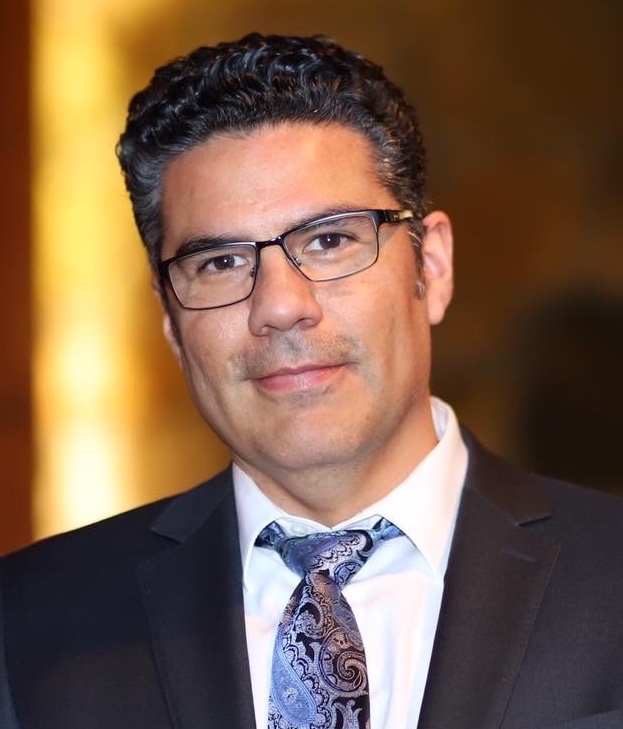 Attendee Cesar Gonzalez (pictured left), pastor of Chesapeake Conference’s Beacon of Light and Cambridge churches on Maryland’s Eastern Shore, referenced his article titled, “Ethical Evangelism” (coming soon): “Our form of evangelism was developed in a time when the vast majority of the population was already Christian. It [assumes] that people will have a strong understanding of the gospel and respect for the authority of the Bible. This is no longer the case, and I think it is why only one or two percent of people that receive mailings will respond.”
Attendee Cesar Gonzalez (pictured left), pastor of Chesapeake Conference’s Beacon of Light and Cambridge churches on Maryland’s Eastern Shore, referenced his article titled, “Ethical Evangelism” (coming soon): “Our form of evangelism was developed in a time when the vast majority of the population was already Christian. It [assumes] that people will have a strong understanding of the gospel and respect for the authority of the Bible. This is no longer the case, and I think it is why only one or two percent of people that receive mailings will respond.”
Gonzalez says that most Adventists he meets are graying and over 55-years-old, and “the way that we do evangelism has been left behind by the culture. And we have to adapt to the culture that we’re in now.”
He continued, “I would ask them, tell me how your kids would like to attend a 30-day Revelation Seminar? ... I think most people realize that they’re imposing something on somebody that they don’t know that they would never impose on someone that they love. ... And that has to change. ... If we can’t reach our own kids, then how are we going to reach people that we don’t know who are very much like our own kids?”
Participant Ryan Comeau (pictured below with Bondurant), associate pastor at Chesapeake Conference’s Hagerstown (Md.) church, a young adult, says if we want to appeal to younger audiences, something else must be done. “Millennials and Generation Z want to live in the now, and we should gear our evangelistic efforts toward the present. I’m not saying we should throw out our belief in the Second Coming, but we should show how that belief and others pertain to their lives today. ... We need to make the gospel [message we share] relevant.”
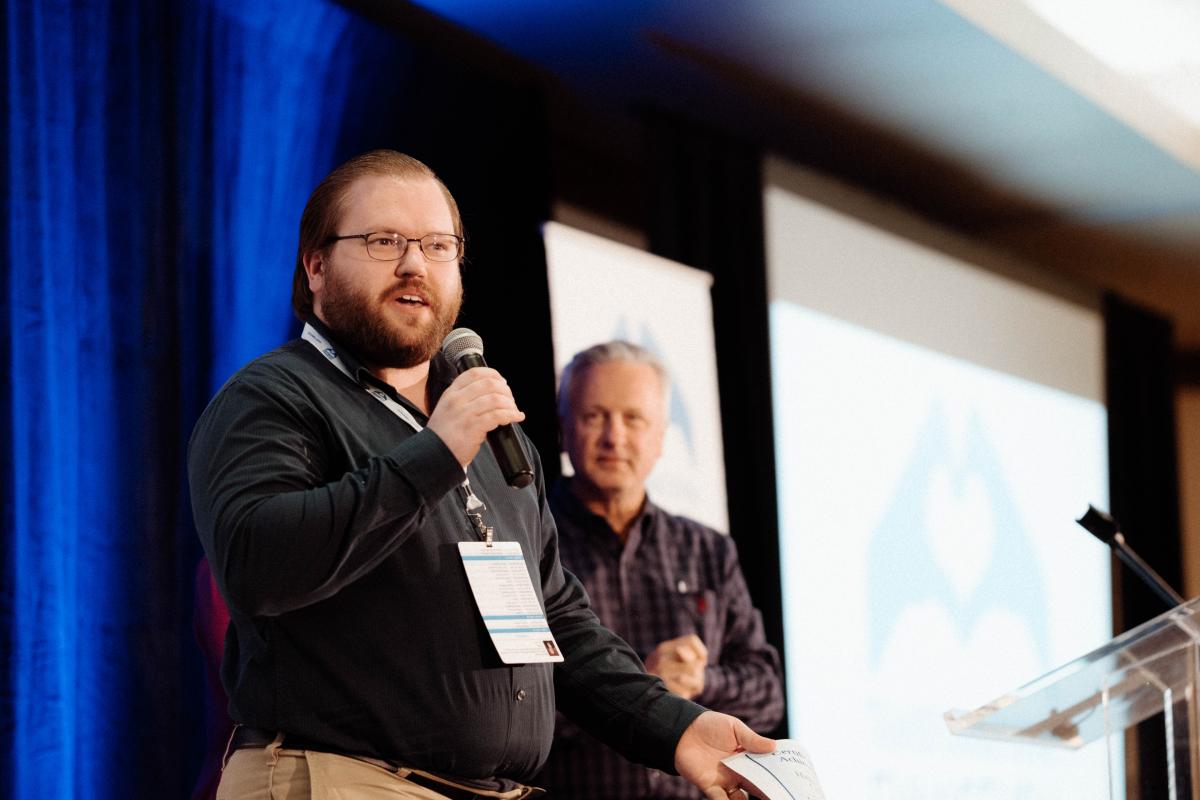 One way his church is trying to do this is by planning Christ Con, a Christian gaming and entertainment convention designed for and planned by young adults with smaller meetings throughout the year. This project won funding during the Transformational Evangelism’s “Shark Tank” event. “With an event like this, connections can be made through shared interests and trying out a variety of games together. ... It will also serve to inspire our young adults to begin the lead-up events this summer. ... Hopefully by connecting with others, we can eventually connect them with Christ,” he says.
One way his church is trying to do this is by planning Christ Con, a Christian gaming and entertainment convention designed for and planned by young adults with smaller meetings throughout the year. This project won funding during the Transformational Evangelism’s “Shark Tank” event. “With an event like this, connections can be made through shared interests and trying out a variety of games together. ... It will also serve to inspire our young adults to begin the lead-up events this summer. ... Hopefully by connecting with others, we can eventually connect them with Christ,” he says.
Do Not Feed Them So They Can Be Baptized
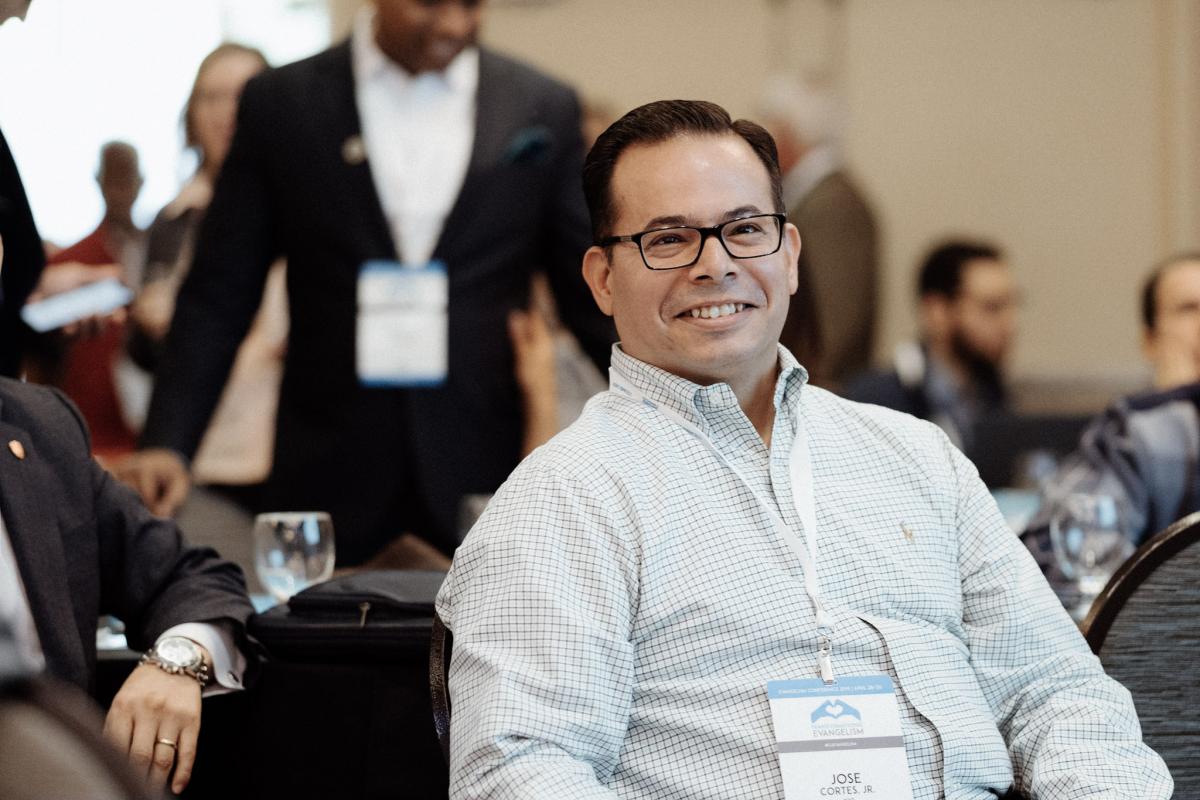 “If you go to the Bible, people didn’t follow Jesus, didn’t love Jesus because of His diet, music or dress. Jesus wasn’t loved because of His profession,” said presenter José Cortes Jr. (pictured left), associate director of Evangelism for the North American Division Ministerial Association. “People loved Jesus because Jesus loved people. Our problem isn’t with our message. We need members who are filled with the love of God and the compassion of Jesus.”
“If you go to the Bible, people didn’t follow Jesus, didn’t love Jesus because of His diet, music or dress. Jesus wasn’t loved because of His profession,” said presenter José Cortes Jr. (pictured left), associate director of Evangelism for the North American Division Ministerial Association. “People loved Jesus because Jesus loved people. Our problem isn’t with our message. We need members who are filled with the love of God and the compassion of Jesus.”
Cortes continued, “We do not feed them so they can get baptized; we feed them because they are ‘hungry.’ We do compassion because it transforms individuals and communities. ... And because it helps us make friends and gains the confidence of those who are blessed regularly. ... It makes proclamation more effective. ... But compassion isn’t a substitute for proclamation. Somebody has to tell the story [of] Jesus. But it becomes a lot easier to tell them about Jesus when somebody has already shown them.”
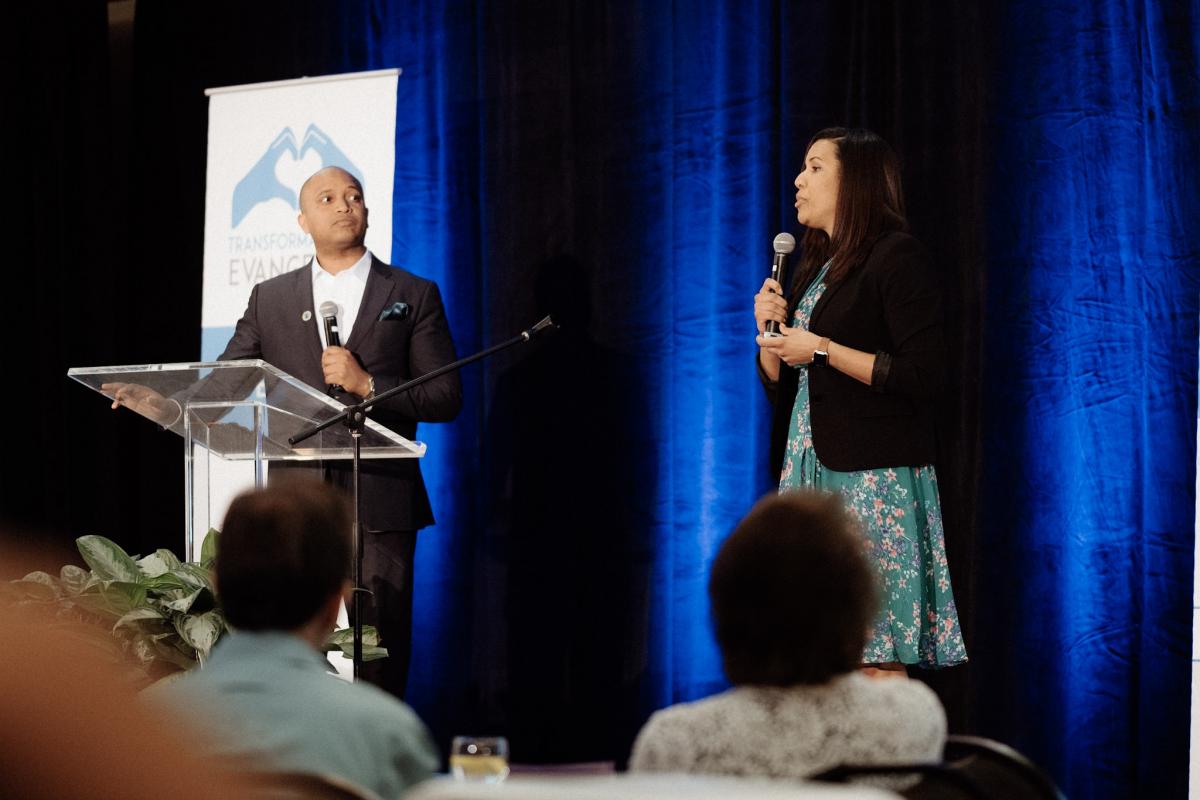 Edwin and Brenda DePaula (pictured, right) are doing just that at Pennsylvania Conference’s Allentown Hispanic Community church, which they helped start and lead. Knowing they wanted to be a community church, they first prayed, listened to current and former members and reached out to local community organizations to discover what their needs were, then put together a strategic plan.
Edwin and Brenda DePaula (pictured, right) are doing just that at Pennsylvania Conference’s Allentown Hispanic Community church, which they helped start and lead. Knowing they wanted to be a community church, they first prayed, listened to current and former members and reached out to local community organizations to discover what their needs were, then put together a strategic plan.
“We wanted to know how we as a church could [best] serve the community,” says Edwin, the chuch’s volunteer lay pastor.
“We’re passionate about our community (See presentation). We’re passionate about our church and wanted to give back somehow,” added Brenda, church communication director.
From bringing speakers to present on topics like depression, addiction and domestic violence to asking other organizations how church members can help, they focus on building relationships and meeting identified needs.
Another method a church can use to meet the needs in the community is what Gonzalez did in his Cambridge congregation when they started hosting a FLAG (Fun Learning About God) camp. The first summer his churches had five staff that hosted seven campers— all church kids. They soon started opening the camp to the community and 45 children eventually came.
“We started to realize early on that these kids were hungry. ... And when they came in and started asking for lunch at 10:30 a.m., we looked around and said we have to do something,” he said. Church volunteers [who provided food] “eventually opened the camp for two weeks but realized that when camp was over, the kids went back out on the streets, again having a ‘Snickers and a Coke for lunch,’” says Gonzalez. They knew they had to do something and expanded the program to six weeks.
“Although I have created many relationships and bonds with kids and their families from my time working with FLAG Camp, I have not added any new members to my church from this program. Is it worth it? I struggled with this question for months. The answer seemed simple, ‘Yes, of course it’s worth it,’” said Gonzalez in “Ethical Evangelism.” “But the reality for an Adventist pastor is a bit more complicated. We work in an ethereal sort of economy. While other ‘industries’ have a tangible product and the value of their workers can be easily calculated in dollars, a pastor’s only tangible ‘product’ is baptisms.”
But isn’t the intention of evangelism to introduce and wel- come people to the Seventh-day Adventist Church?
Evangelism Is Not An Event
“Friendship, kindness and compassion ministries are crucial foundations for evangelism. Scripture is clear that we are called to compassion ministry. It helps members grow an outward focus and establishes a positive reputation in the community,” says Larry Witzel, who worked for 20 years as a pastor and is president of SermonView Evangelism Marketing, a provider of marketing services to Adventist churches throughout North America. “But the data says, if we don’t ask for decisions, people don’t join the church. The Seventh-day Adventist churches with the most baptisms across the [North American Division] include public meetings as part of the evangelism cycle.”
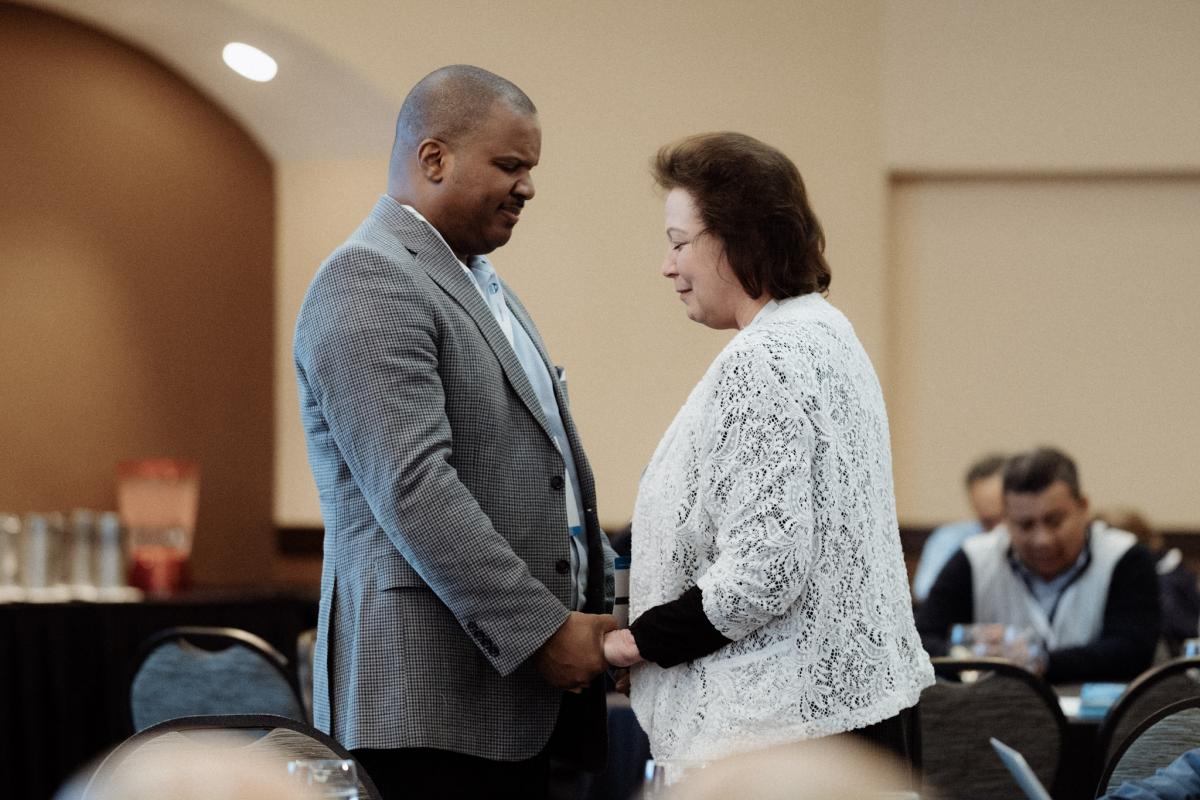 Presenter Carlton Bryd (pictured praying with Bonnie Cutright), senior pastor of the Oakwood University church in Huntsville, Ala., and speaker/director of the Breath of Life Television Broadcast, believes evangelism and a healthy church culture can lead to growth. “Evangelism is not an event; it is a process,” said Byrd. “Everything a church does should reflect evangelism.”
Presenter Carlton Bryd (pictured praying with Bonnie Cutright), senior pastor of the Oakwood University church in Huntsville, Ala., and speaker/director of the Breath of Life Television Broadcast, believes evangelism and a healthy church culture can lead to growth. “Evangelism is not an event; it is a process,” said Byrd. “Everything a church does should reflect evangelism.”
This includes the Sabbath morning worship experience, says Emil Peeler. In his session, “Making Your Sabbath Worship Service an Evangelistic Experience,” Peeler, senior pastor of Allegheny East Conference’s Capitol Hill church in Washington, D.C., posed the following questions: “Is your church warm? Is your church loving? Is it accepting of those who may not look like you? If you want to make your church, your worship service more evangelistic, I want to challenge the leaders to do the best you can to cultivate a warm atmosphere and to turn the focus of your worship to God. It isn’t about you. It isn’t about me. It isn’t about our likes and pref- erences. It’s about God. ... We have to make sure the focus of worship is to God and God alone.”

